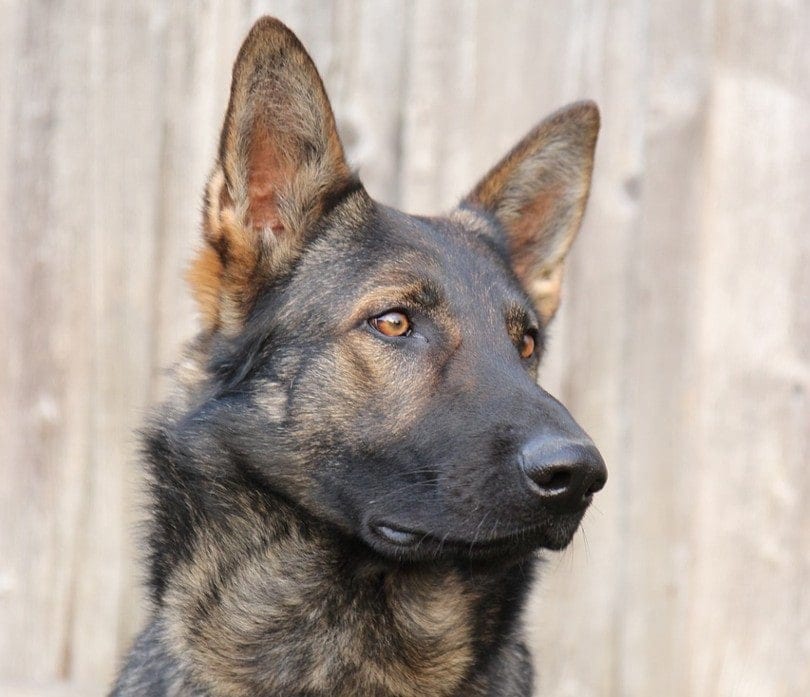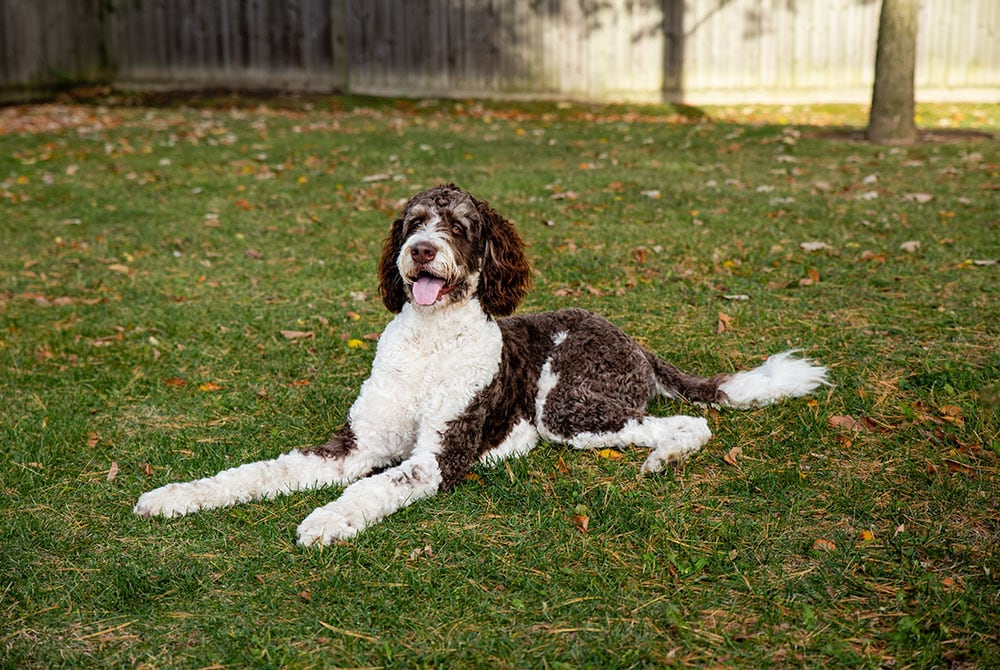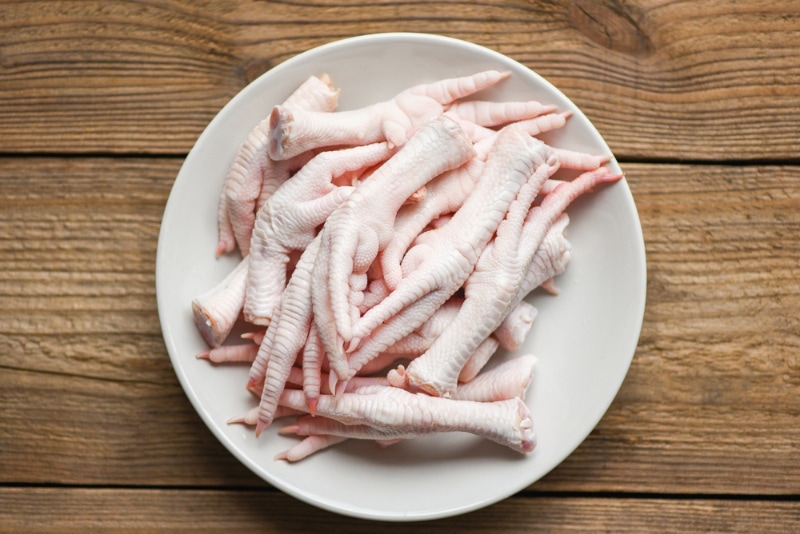Do Dogs Stress-Eat? Important Facts to Know and How to Stop It

Updated on
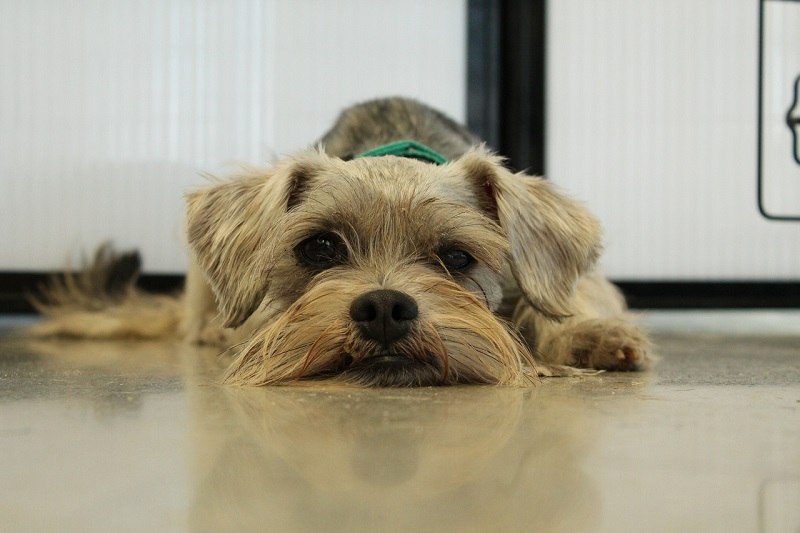
Human beings have a vast emotional spectrum, ranging from simple emotions like happiness to more complex ones like regret. It’s not uncommon for us to engage in self-destructive behavior, like stress-eating, when our emotions get the best of us. Studies show that eating fatty and sugary food dampens feelings of stress and subsequent responses.1 But does the same apply to our canine friends?
Canines have a pretty limited emotional range, with the emotional complexity of a 2-and-a-half-year-old toddler at peak emotional maturity.2 While they’re not as emotionally complex as humans, dogs still stress and experience emotional turmoil from time to time. But are their eating patterns affected by stress, and do they eat comfort food to ease their stress?
Yes, dogs stress-eat and indulge in comfort food to alleviate negative emotions. In fact, stress-induced comfort eating has been linked to obesity in dogs and other animals. Keep reading to learn everything you need about the relationship between your dog’s emotions and food.
What Is Stress-Eating?
Stress-eating, or emotional eating, describes a pattern of over-indulging in food to cope with stressful situations. It manifests in various ways, from eating a simple snack after a stressful day at work or gobbling down an entire tub of ice cream after a breakup.
Stress-induced eating could have far-reaching health and psychological implications. It’s an unhealthy coping strategy that only worsens the situation. Chronic stress-eating leads to obesity, which lowers self-esteem, making you stress-eat even more. This leads to a vicious cycle that takes a lot of willpower to get out of.
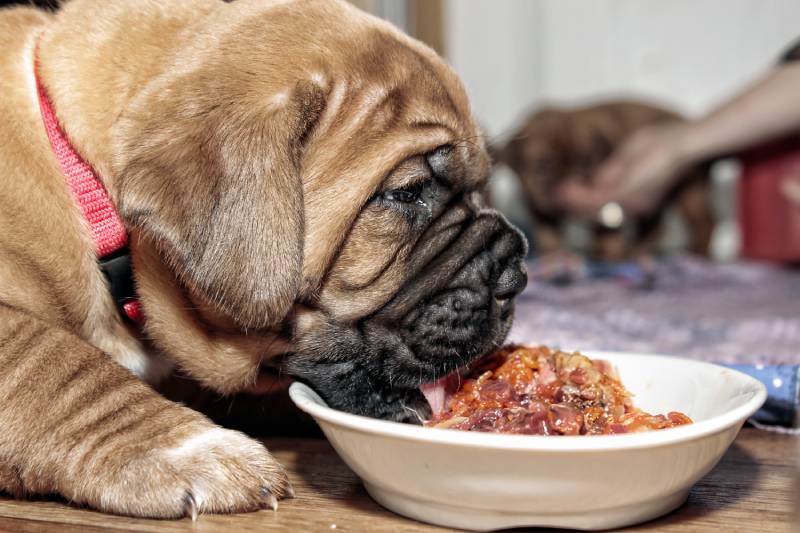
Do Dogs Stress-Eat?
Yes, dogs also stress-eat when they feel a bit under the weather. However, unlike humans, dogs don’t have as much say as to what and when they can eat. A voracious appetite that deviates from the norm is a major sign of emotional-induced eating in dogs. When your dog eats twice as much as it usually does, it’s probably stressed and taking it out on food.
You should be concerned when your dog starts to stress-eat, given that about 25% to 30% of dogs in the US are obese. Obesity shortens your dog’s lifespan and makes it more predisposed to diseases like heart disease, hypertension, and cancer.
What Emotions Trigger Stress-Eating in Dogs?
Like humans, dogs also stress-eat when overwhelmed with negative emotions. Food becomes a coping mechanism to help them through these rough feelings. Some emotions that can cause emotion-induced eating in dogs include:
- Stress
- Boredom
- Anxiety
- Depression
Dogs also feel depressed, but how they respond varies from dog to dog. Some dogs respond by overeating, while others don’t eat at all. The latter is one scenario where stress-eating is actually better for the dog. An obese canine is better than a malnourished one. However, emotional eating combined with a lack of exercise and junk food is risky for your dog’s health.

Is Stress-Eating Bad for Dogs?
Yes, stress-eating is bad for dogs, especially those with pre-existing conditions. Here are a few dangers of stress-induced eating in dogs.
Obesity
Stress-eating is likely to lead to over-eating, which leads to obesity. Obesity is the excessive buildup of excess adipose tissue in your dog’s body. It differs from being overweight, which is when your dog weighs more than it normally should. That’s why you can find dogs that are obese but not overweight. Obesity shortens your dog’s lifespan and makes them more prone to certain diseases.
Joint Pain and Instability
The more your dog stress-eats, the more weight it gains. Over time, this excess weight will take a toll on your dog’s joints, leading to joint pain and balancing issues. It also makes them more prone to injuries and diseases like arthritis.

Bloating
Dogs get bloated when they eat their food or drink their water too quickly. Bloating describes when the dog’s stomach fills up with gas and puffs up. While it’s easy to shrug off bloating in your dog, it could quickly escalate into something more serious. This is especially true for large dog breeds like Chinooks and Bernese Mountain Dogs.
If left untreated, bloating can quickly become a life-threatening condition. As gas fills up your dog’s stomach, it contorts and limits or stops blood from flowing into the gut. It also stops food from entering or leaving the stomach. In severe cases, the stomach’s puffing up is large enough to block crucial veins from supplying blood to the heart. This can be fatal.
Pancreatitis
Pancreatitis is a type of disease that causes redness and swelling of the liver. Studies have not conclusively established the exact cause of pancreatitis in dogs, but most cases are linked to ingesting excessive spicy and fatty foods.
Spicy and fatty foods sit high on your dog’s list of comfort foods to eat when stressed. Your dog will likely eat copious amounts of fatty and spicy foods to cope with unpleasant emotions, increasing their risk of pancreatitis. While pancreatitis is curable, severe cases could lead to shock and sudden death.

How Can You Stop Your Dog From Overeating?
Is your dog a habitual stress-eater? If so, there are a couple of things you can do to stop them from stress-eating.
- Removing the Stressor – The easiest way to stop your dog from stress-induced eating is to remove whatever’s stressing it. The stressor could be a new environment, an unfamiliar person, or a threatening canine. Pulling your dog away from its stressor reduces its stress levels and instantly cribs stress-eating.
- Control Food Portions – Stress-eating spirals out of control when you give your dog too much to eat. Control how much food you give your dog so it can find better ways to cope with unpleasant emotions. Dog food typically has recommended serving amounts on the packaging. Follow these guidelines to avoid under or over-feeding your dog.
- Have a Strict Feeding Schedule – Feeding your dog on impulse allows more room for stress-induced eating. By having a set feeding schedule, you can time your dog’s feeding to ensure it doesn’t eat too much. Without a proper schedule, your dog will keep nagging you for food when stressed.
- Adopt a Low-Calorie Diet for Your Dog – Dogs prefer delicious comfort food to quell negative emotions. This food includes unhealthy but tasty junk and fatty food. Introducing less tasty, low-calorie food into your dog’s diet will make them less likely to stress-eat. You can try vegetables like lettuce or fruits like blueberries.
You can complement these useful tips with our calculator tool here:
 Conclusion
Conclusion
Don’t get too worked up when you notice your dog is an avid stress-eater. Stress-eating is a natural way for your dog to put up with not-so-pleasant emotions. But if this gets out of hand, you might need to consult a dog behaviorist to help you figure out the cause of the stress. That way, you can take steps to remove the stressor or decide how best you can stop the stress-induced feeding.
See also:
- Does Stress Give Dogs Diarrhea? 9 Stress Signs to Look Out For
- Does Petting a Cat or Dog Reduce Stress? Here’s What Science Says
Featured Image Credit: joangonzale, Shutterstock



 Conclusion
Conclusion